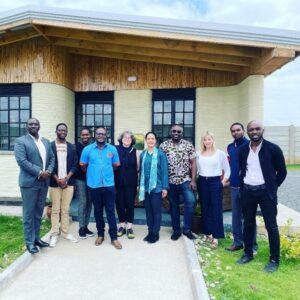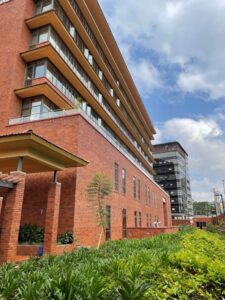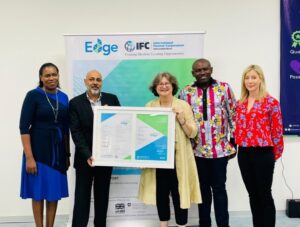Stories
Green Buildings Driving a Growing Investment Market Across Africa
From affordable housing to universities, EDGE certified projects are increasing in multiple African countries, as this growing market for investors gains attention in the lead up to an Africa-based COP in 2022.
With more than 4.2 million square meters of EDGE-certified floor space throughout the continent, many African countries have become proven growth markets for green buildings. From an affordable home built with a 3-D printer to a groundbreaking energy-efficient hospital, projects across Africa have been making strides to prove that green buildings in emerging markets are not only feasible, but great for business.
IFC research in three African nations shows the green building market steadily growing from early signs of emergence in Ghana to a moderately developed market in South Africa, where Nedbank, a major financial institution, partnered with IFC to expand its green finance offerings. In Kenya, signs of early growth in building green are also emerging. Particularly in the realm of affordable housing, the country faces a vast deficit, which it hopes to address in part with green home project development.
Read the latest Green Building Market Intelligence Reports from Ghana, Kenya, and South Africa. These Green Building Market Snapshots are a summary of key market indicators based on IFC’s research on policy environment, building construction, and Green Building certification and finance.
A driving factor in the expansion of sustainability in the built environment, African urbanization is climbing dramatically along with the rest of the globe. With current urban population rates at 43%, it is expected that nearly 60% of the population across the continent will be living in urban areas by 2050. With the UN reporting that buildings account for nearly 40% of energy-related greenhouse gas emissions annually, the need for investment in a strong green building market and decarbonization of existing building stock in Africa is clear.

In Kenya, the developer 14 Trees has built an EDGE Advanced 3-D printed sustainable home, the first of its kind in Africa. This groundbreaking home is the first part of a larger plan seeking to use the “Garden City” concept of the early 20th century and combine the best aspects of urban and country living. The 3-D printing process uses minimal materials, only printing exactly what is needed for the structure of the house. 14 Trees hoped to not only save energy and water during the construction process, but also during the operational phases, which led them to certify their homes with EDGE.
In the healthcare sector, Aga Khan University Hospital in

Kenya has achieved EDGE Advanced Certification for their sustainable campus in Nairobi. Architecture firm Payette designed a naturally ventilated campus, with features like open-air corridors providing energy-efficient cooling. The university plans to use the campus as an educational tool to expose both students and staff to sustainable design. Aga Khan has set the goal to decarbonize their building portfolio by 2030 and has now implemented a policy for all new buildings to achieve a certification level of at least EDGE Advanced or beyond.
“The certification of the University Centre is exemplary for its holistic approach, taking sustainability and energy reduction right into the building design, not something added on later. Similarly, designing spaces that allow students and educators to nourish their learning is something other institutions in the region can learn from,” said AKU President Dr Sulaiman Shahabuddin.
In both Ghana and Kenya, developer REALL is also making progress towards widespread availability of green affordable housing. REALL recently launched their first EDGE-certified affordable housing project in Northern Ghana, delivering 100 two-bedroom homes in Tamale. This project marks a milestone for low-income homebuyers in Ghana, a country that faces a housing deficit and poverty issues like those in Kenya.

According to Tom Woodward, Reall’s Climate Lead, “making affordable housing green does not have to be complicated or expensive… At Reall, we are excited to continue working with [local developer] Afreh Group and IFC to help ensure that low-carbon, energy-efficient and resilient affordable housing becomes increasingly accessible, particularly to low-income communities, across West Africa as a whole.”

In Nigeria, a growing urban and student population is pushing developers to increase housing projects to address shortfalls. One developer, KARMOD, is championing prefabricated green homes as a more environmentally friendly and sustainable path to affordable housing delivery, recently securing a financing deal with Sterling Bank for an EDGE Advanced-certified housing project in Nigeria’s capital Abuja. In the healthcare market, Evercare Hospital recently opened the first EDGE-certified resource-efficient hospital in the country.
With more than 170 universities and colleges in Nigeria, student accommodations are a major building sector—and an important market for potential investment in energy-efficient development. Student Accommod8, a developer and operator of purpose-built student accommodation (PBSA), has already achieved EDGE Certification for multiple student housing projects in Nigeria. Another private equity fund focusing on the development of student housing, Greenage, is also leveraging EDGE certification to expand in this market and close the gap.
“We are out to make a sustainable difference in the student housing space in Nigeria… Instead of building in the conventional fashion, which could be in the short term, less expensive, we have decided to think and build green. This is because it shows not only our commitment to building a better climate smart future, but because it makes business sense too for our investors,” an Executive Director with Greenage, Mr. Marcellinus Nnaedozie said.

Beyond the housing sector, another major Africa developer is seeking to revolutionize warehousing toward a Zero Carbon future. Africa Logistics Properties (ALP) has a vision for a more sustainable warehouse industry. The company’s EDGE-certified ALP North Logistics Park is the first modern grade-A logistics and distribution park in Kenya.
In addition to breaking barriers in energy-efficient warehousing in Kenya, ALP has also committed to the EDGE Zero Carbon Pledge. According to CEO Richard Hough, “ALP is determined to move from being a low-carbon to become a zero-carbon developer because it is both the right thing to do for all our stakeholders and because, as a long term investor in our modern industrial buildings, it is the only viable commercial path for our company.” The company has committed to building 100,000 square meters of green-certified industrial buildings in Kenya by 2035, and at least 50,000 square meters of net-zero-certified industrial buildings by 2050.
COP27 will be held in Egypt, where CIB Bank recently launched a $100m green bond as part of its ESG offerings, in November 2022 as the first Africa-based location for the annual UN Climate Conference since 2011. The encouraging growth of green buildings across the continent is a sign for developers and financial institutions—investment in this emerging market could help the climate and your bottom line.

